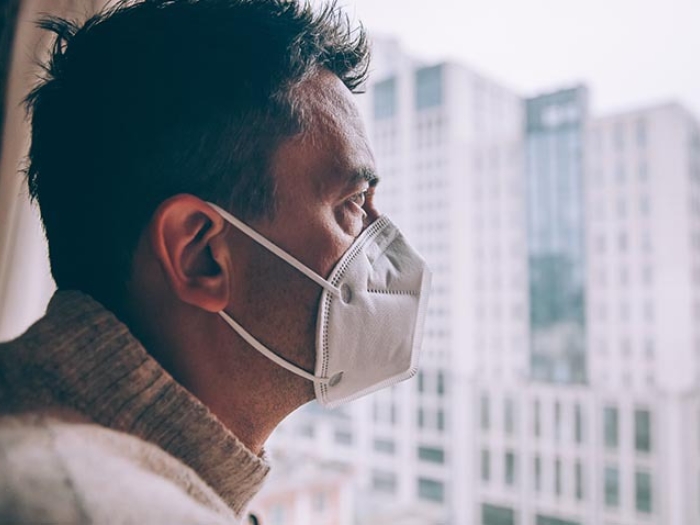A wellness expert offers guidance on how to protect your psychological and emotional well-being during the pandemic.
10:35 AM
Author |

Editor's note: Information on the COVID-19 crisis is constantly changing. For the latest numbers and updates, keep checking the CDC's website. For the most up-to-date information from Michigan Medicine, visit the hospital's Coronavirus (COVID-19) webpage.
Interested in a COVID-19 clinical trial? Health research is critical to ending the COVID-19 pandemic. Our researchers are hard at work to find vaccines and other ways to potentially prevent and treat the disease and need your help. Sign up to be considered for a clinical trial at Michigan Medicine.
This article includes contributions from a similar article written in Michigan Medicine's Headlines publication by Daniel Ellman and Jennifer Williams.
In the midst of managing a situation like the COVID-19 outbreak, it's easy to feel overwhelmed and worried. Focusing on how to slow the spread of the virus is important for our physical health, however, identifying ways to manage our mental health is also crucial.
We may experience increased feelings of anxiety, powerlessness, impatience, irritability or frustration. We might also experience a sense of scarcity, or be concerned about increased stigmatization or xenophobia. We may feel uncertainty about the future or worry about isolation amidst rapidly changing schedules and social plans.
While feeling worried is normal and expected, there are many ways we can increase our resilience during this time:
1. Take breaks from the news.
After a certain point, it can be more upsetting than informational. Make sure the information you do get is from reputable and non-sensationalist sources. And evaluate how much is helpful for you to read in a day, and aim to stick to that limit. It can be upsetting to hear about the crisis and see images repeatedly.
Try to do some other activities you enjoy to return some normalcy back to your life as much as possible. Make time to unwind and remind yourself that these strong feelings will fade.
2. Take care of your body.
Take deep breaths. Stretch. Meditate. Try to eat relatively well balanced meals, move your body regularly, get plenty of sleep and highly limit alcohol and drugs. This will help boost your immunity — and your resilience.
3. Plan for coping with a potentially sudden drop in social contact (e.g., classes & events being cancelled.)
One of the most prominent ways individuals are asked to help mitigate the COVID-19 pandemic is to practice social distancing. That means remaining out of places where people meet or gather, and maintaining distance (approximately six feet or two meters) from others.
In times of crisis, many people seek connection and comfort from others, says Kelcey Stratton, Ph.D., program manager for resilience and well-being services at Michigan Medicine, who is also a clinical psychologist. "It is important to find creative ways to maintain those connections. We might also find some comfort by remembering that we are not alone, and that we are all in this together to protect the health and well-being of our communities."
MORE FROM MICHIGAN: Sign up for our weekly newsletter
Create new traditions for connecting regularly with friends, family and peers via messaging apps, etc. Check in with your people. Call a family member, friend or coworker. Send a text message, direct message or email. Use FaceTime or other video formats to communicate.
4. Create a new, adapted schedule taking cancellations into account.
Keep things as consistent as possible and focus on what you can control in terms of disease prevention and more broadly.
"Our control resides in taking reasonable precautions and avoiding unnecessary risks. To protect our emotional well-being, we can pay attention to reputable sources of information and adhere to the prevention guidelines of Michigan Medicine, the CDC and the World Health Organization," says Kirk Brower, M.D., chief wellness officer for Michigan Medicine.
5. Do a "worry drop."
Write out all of your fears in a journal until your anxiety has dropped by half.
Make a daily list of what is going well, and remember the things that are going well. Despite the current situation, maybe you're able spend more time with your kids, or reading a book you've been meaning to get to or learning how to cook.
If you have a pre-existing mental health condition, these recommendations are especially important. If you have appointments with your therapist or doctor, keep them. If you aren't feeling well physically, ask if they have options for video appointments.
Like Podcasts? Add the Michigan Medicine News Break to your Alexa-enabled device or subscribe for daily updates on iTunes, Google Play and Stitcher.

Explore a variety of health care news & stories by visiting the Health Lab home page for more articles.

Department of Communication at Michigan Medicine
Want top health & research news weekly? Sign up for Health Lab’s newsletters today!





